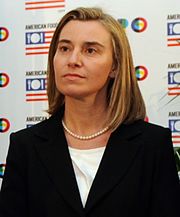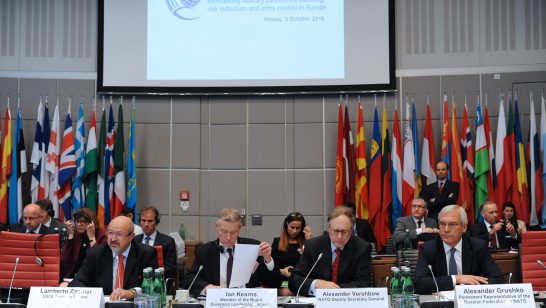
In May 2012, the newly elected, or re-elected, French president will attend the G8 Summit at Camp David and then the Chicago NATO Summit a few days later. If newly elected, the President will have only a few days to be prepared for both meetings.
Since the last Lisbon Summit and its New Strategic Concept, NATO has known or faced several crises or major events. Among these are the war in Libya, the continued war in Afghanistan and the preparation of the endgame there, the Arab Spring, the shift of American defence posture to the Asia-Pacific, and the call to NATO members to increase their contribution to the burden sharing effort within the Alliance.
These developments show that we are in a new century with new opportunities and challenges. The demands of the new century will not wait for NATO. The Alliance must embrace change and change itself to tackle the challenges ahead. Further postponement of urgent questions will not be good enough and, as we approach Chicago, those questions come in a number of forms.
First, there is the question of the over-arching role of NATO. In the new international strategic context what is the vision for NATO’s future and, more particularly, what is the vision for NATO’s future in a world where the United States is less engaged in Europe and where we perceive the limits of a policy based on unilateral US hegemony? Second, how will the concept of the comprehensive approach be applied by NATO in out of area missions and in missions that require action outside of the traditional military framework, and how will NATO activities in these areas relate to or challenge the missions of European Union? Third, what is the responsibility of European member states in the decision-making and implementation processes inside NATO and are the European states willing to do what it takes to accept this responsibility?
Another vital issue that must not be avoided at Chicago concerns NATO nuclear posture and the US non-strategic nuclear weapons stationed in Europe in particular. Everyone acknowledges that these weapons are a cold war relic and that they no longer serve a military purpose. Moreover, they are not subject to any arms control treaty at all. Furthermore, moves toward the procurement of new dual-capable aircraft and the life-extension program in the US for the B-61 bombs, underline the political and financial costs of such weapons and the urgent necessity, on both security and financial grounds, to move toward nuclear threat reduction.
The Chicago Summit is a chance for member states to reach agreement on what the Alliance’s posture should be with regard to non-strategic nuclear weapons in Europe, and also to signal a willingness to negotiate the removal all NATO non-strategic nuclear weapons from the continent through their relocation back to national storage facilities in the US. At Chicago the NATO members could also agree to delegate negotiating responsibility on this issue with Russia to US arms negotiators in the frame of ongoing consultations within NATO.
At this point in time, the issue of the NATO-Russia relationship is more fundamental than ever. The reopening of negotiations and consultations with Russia on security issues including non-strategic nuclear weapons, conventional forces, and missile defense must be a priority. At Chicago a new impulse should be given to these consultations and both NATO and Russia should initiate a process of staged confidence and security-building measures. Progress on ballistic missile defence cooperation in particular could help to transform the relationship.
Beyond nuclear, the Libya campaign revealed major gaps in the Alliance’s conventional military capabilities and consequently the urgent necessity to develop common programs and real capability-sharing to make limited national resources go further. This is the goal of the Smart Defense concept but it must not be a screen either for the US to impose its programs and technologies or for measures that might ultimately undermine rather than improve European security.
The joint NATO missile defense program as currently planned is an illustration of the potential opportunities and dangers. The difficulty of building a reliable, viable and cost-effective ballistic missile defense system, its possible impact on the future of the defence industry in Europe, on the relationship with Russia, and finally on world strategic stability mean that this potentially worthwhile programme must be studied in great detail. It must be adapted to the needs of European security politically and financially, and the challenge for NATO countries is to make from this American project something that is genuinely beneficial to all allies, and something that is genuinely multilateral. There is time to do this as there is no urgent military requirement to deploy missile defences in Europe. But it is also vital for the security of all of us and for global strategic stability that dialogue with Russia continues in the hope of ensuring that BMD deployments do not destroy trust and limit future cooperation across the old NATO-Russia divide.
The new challenges before us show that NATO needs deep change. In theory the new Deterrence and Defence Posture Review should bring answers to these questions and allow flesh to be put on the bones of the NATO strategic concept while allowing NATO to demonstrate that it has learned the lessons of Libya and elsewhere.
In fact it seems that the final document in Chicago will express more of a wait and see attitude. The proximity of the US presidential election and the wish for consensus from several European countries explains why this is likely to be the case. In a context in which we need ambitious proposals the reality is likely to be a final document that will be modest. The question of non-strategic nuclear weapons will be avoided, the controversy with Russia about missile defence is unlikely to be discussed, and a further NATO-Russia meeting at summit level is likely to be postponed.
If this is what actually happens, it will be extremely harmful for NATO. The Alliance will have lost the opportunity to put in place a strategy adapted to our changing world and to make NATO better able to deal with the urgent challenges of the future.
In France, whoever is elected President, we are unlikely to see any change in position in the foreseeable future. The two main candidates in the election have already announced that France will stay in the NATO integrated military command and will keep the same nuclear deterrent. France does not wish to see the NATO non-strategic nuclear weapon question on the table. If Francois Hollande, the Socialist candidate, is elected, his defence priority will be to withdraw French troops from Afghanistan in 2012, sooner than is currently planned. And whether it is Hollande or Sarkozy, France will continue to insist on preserving the interests of the European armament industry within NATO’s Smart Defence programme and throughout the ongoing efforts to implement NATO-wide missile defence.
This all points to the Chicago summit being a non-event. As NATO leaders board their aircraft to leave for home after the summit communique has been issued, the output of the DDPR will leave unanswered questions about the future of NATO all over the airport runway.
General (Ret.) Bernard Norlain is former Air Defense Commander and Air Combat Commander of the French Air Force, and the President of the Comité d’Études de la Défense Nationale and Director of the Revue Défense Nationale.
Click here for previous ELN Chicago Papers.
The opinions articulated above represent the views of the author(s), and do not necessarily reflect the position of the European Leadership Network or any of its members. The ELN’s aim is to encourage debates that will help develop Europe’s capacity to address the pressing foreign, defence, and security challenges of our time.



